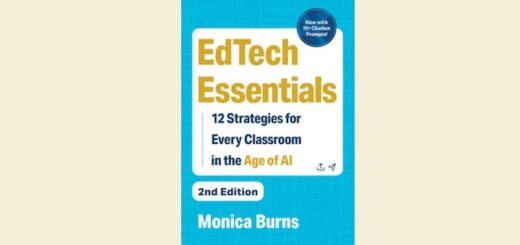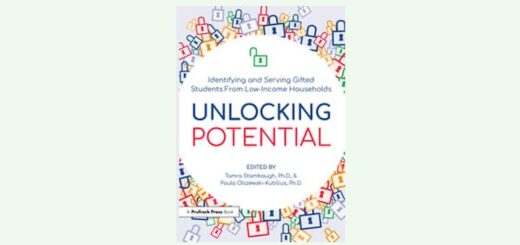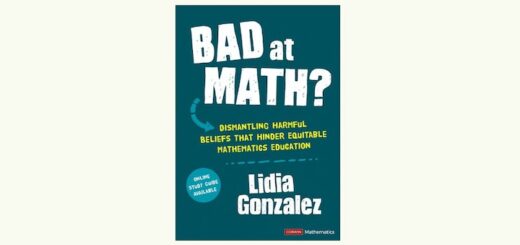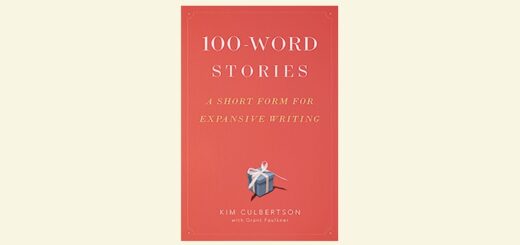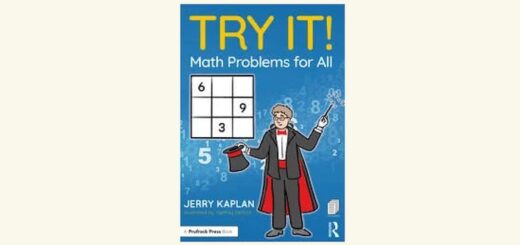Assuring Just, Inclusive Learning for Newcomers
Radically Inclusive Teaching with Newcomer & Emergent Plurilingual Students: Braving Up
By Alison G. Dover and Fernando (Ferran) Rodrigues-Valls
(Teachers College Press, 2022 – Learn more)
Reviewed by Kimberlee Elder
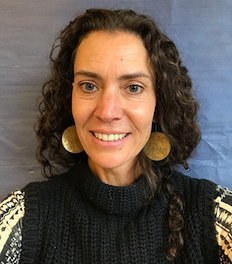
More importantly, through their research, personal reflections, and classroom practice, Braving Up offers creative and effective solutions. With their guidance, teachers explore their personal and professional identity to build expertise in welcoming and meeting the needs of culturally, linguistically, and experientially diverse students.
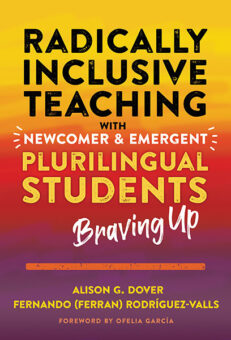
Attaining justice in education
It is through these tweaks of structures currently in place that we will ultimately be able to transform our educational communities into more just learning environments for our plurilingual students.
Chapter 2, “The Ground on Which We Stand: Conceptual Foundations for Braving Up,” is solid and powerful. The authors share essential understandings in this chapter. For educators new to this work, this chapter is the place to dive in to build a foundation of both past and present policy as well as key vocabulary.
For example, included in this chapter are explanations of languaging, monolinguistic ideology, and linguistic dominance. On page 21, figure 2.3 is a flow chart entitled “Student-Centered Teaching in Action.” From this point forward in the book, the authors pivot, and in their words, “…we explore the pedagogic and political actions that comprise our work, which we explicitly position as an act of teaching for social justice, intended to disrupt oppressive educational discourse and policy, and reimagine schooling as inherently bound to our individual and collective humanity.“ (p. 20)
Resources for reaching the goal
Chapter 3 and beyond explain the “how” interwoven with the “why.” Dover and Rodrigues-Valls unveil their Language Explorers program. At times this comes off as a sales pitch to purchase and participate in the program. At other times, the anecdotes provide helpful insights.
For example, the focus on “Exploring Identity with Arts-Based Pedagogy” in Chapter 5 details student and educator projects. These resources provide an accessible jumping in point. Similarly, in Chapter 7, the authors provide ample resources for “Humanizing Online Learning” (pp. 94-106)
There are a few areas where I am left wanting more. It would be helpful for teachers who are beginning to engage in this work to learn the difference between the lexicons: EL, ELL, ESOL, TESOL, but most importantly multilingual (ML) versus plurilingual (PL). This shift from ML to PL is very much in line with the authors’ mission, and it would be helpful for them to dive deeper into this and explain why the shift matters.
Similarly, I am also wanting more acknowledgement of the urgency in language acquisition our secondary plurilingual students experience. From high stakes testing to language barriers in math placement, and a lack of foundational literacy instruction, our plurilingual newcomers face enormous academic obstacles.
With that being said, I am grateful for this book. The authors’ stated purpose to elevate “[t]he importance of culturally and linguistically responsive (multi) literacy-rich instruction that invites and validates the cultural and linguistic experience of newcomers,” (p.27) is achieved.
Kimberlee Elder, M.A. Ed is a TESOL educator and curriculum consultant. Specializing in programming for SLIFE, she has two decades of education experience working in the US, Latin America and Africa. She lives in Portland, Maine with her husband, three sons, and one large female dog.
Elder’s side note: Portland has received 1,600 asylum seekers since January 2023 [written in August, 2023]. There was already a sizable homeless, immigrant and asylee population present and competing for resources. We, as a city, state and country, are at a critical apex and in need of both immigration policy and education reform to build equitable, inclusive and just communities.

















